Key takeaways:
- Understanding key components of book contracts, including advance payments, termination clauses, and subsidiary rights, is crucial for an author’s long-term success.
- Negotiating effectively, particularly regarding royalty percentages and rights retention, empowers authors and can significantly impact future earnings and opportunities.
- Taking the time to thoroughly review contracts, seek professional advice, and understand deadlines can prevent misunderstandings and protect creative freedom.
- Finalizing a book contract is a significant milestone; authors should reflect on their agreements and celebrate their achievements to fuel motivation for future work.
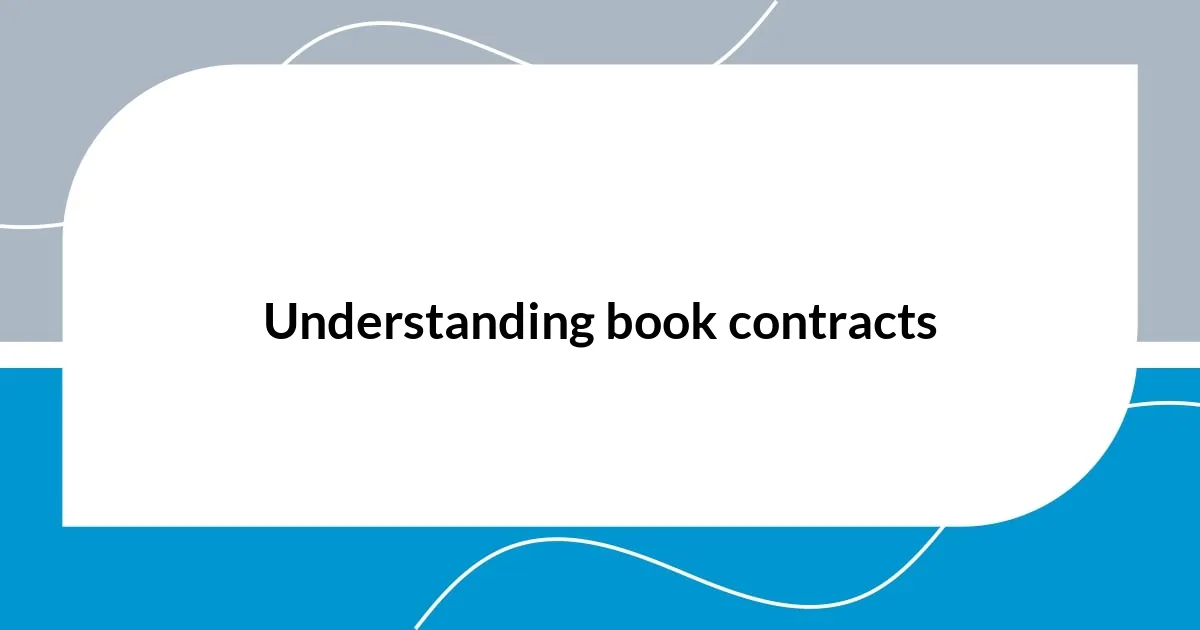
Understanding book contracts
When I first encountered a book contract, the whirlwind of legal jargon felt overwhelming. I remember sitting at my kitchen table, staring at clauses I didn’t fully understand, wondering whether I was making the right decision. Have you ever felt that mix of excitement and anxiety when diving into something new? It’s a common experience, and taking the time to break down each section can make all the difference.
Understanding the key elements of a book contract is crucial. For instance, the royalty structure often determines your earnings—something I discovered when I realized a higher advance didn’t always mean greater long-term profits. Have you considered how the terms might affect your future writing career? It’s essential to balance short-term gains with sustainable success.
As I negotiated my first contract, I learned the importance of rights—especially foreign and adaptation rights. I felt a tingle of potential as I imagined my story translated into different languages or adapted into a film. Isn’t it thrilling to think that your words could reach audiences around the world? Knowing which rights you’re giving away—and under what terms—can shape your author journey immensely.
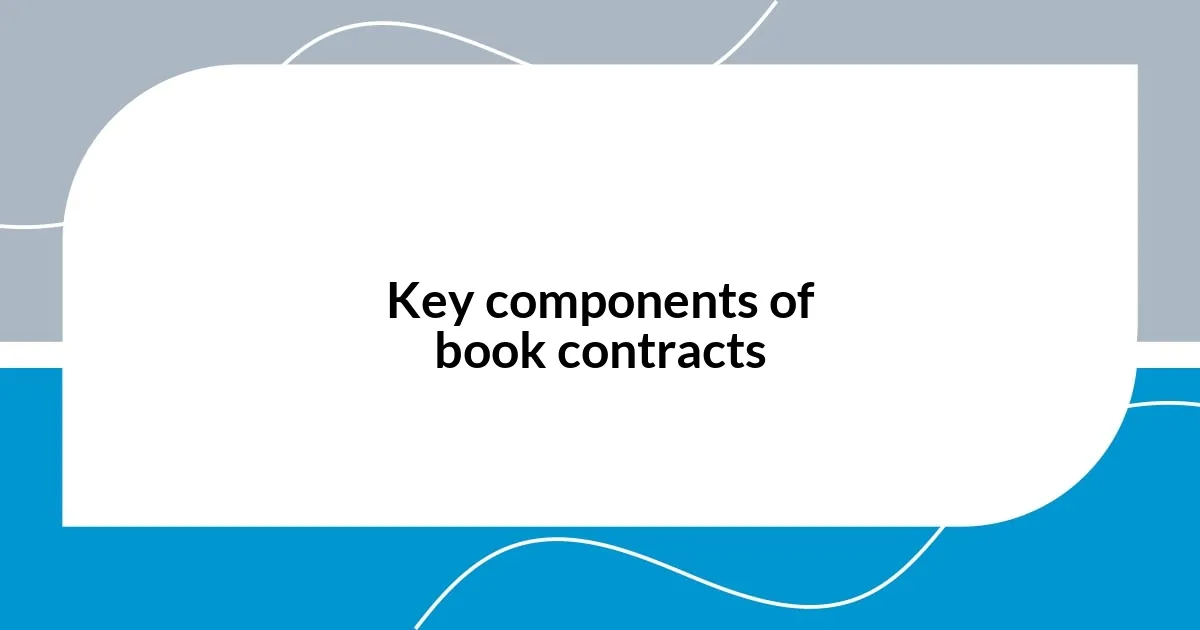
Key components of book contracts
Understanding the key components of book contracts is more than just a necessity; it’s a crucial step in your writing career. One of the first elements I examined was the advance payment. When I secured my first advance, I felt an exhilarating rush—like crossing a finish line. It didn’t take long, however, for me to understand that it wasn’t just about the upfront amount; it was how that advance worked in relation to royalty earnings that really mattered.
Another vital aspect that often gets overlooked is the termination clause. This wasn’t something I considered until an author friend of mine found themselves in a sticky situation. They were stuck under a contract that severely limited their ability to publish elsewhere. It made me realize how important it is to know when and under what conditions you could exit a contract. Have you thought about how restrictive contracts might hinder your creative freedom? It’s a question worth pondering.
As I delved deeper into my contracts, I discovered the importance of subsidiary rights. These are the rights that allow for adaptations, translations, or even audiobook versions of your work. Each time I thought of my book being adapted into a theatre production, a spark of excitement lit up inside me. My journey taught me that ensuring you retain as many rights as possible can open up more avenues for your storytelling down the line.
| Component | Importance |
|---|---|
| Advance Payment | Understanding how it relates to royalties is key for long-term earnings. |
| Termination Clause | Knowing when and how you can exit the contract safeguards your creative freedom. |
| Subsidiary Rights | Retaining these rights allows for adaptations and other creative opportunities. |
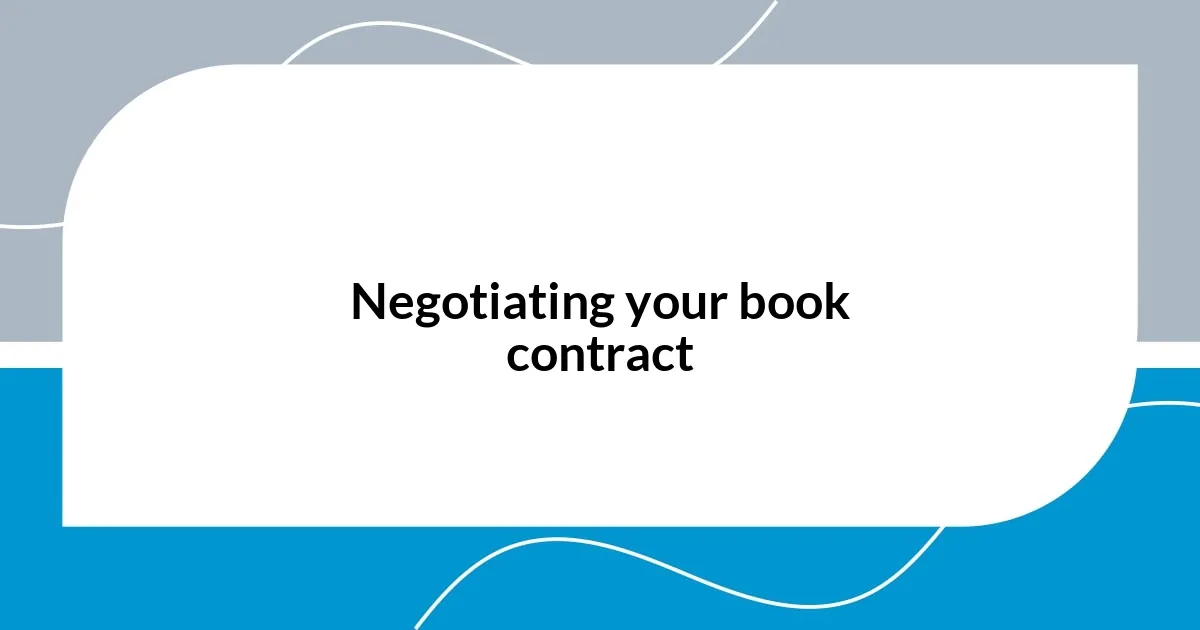
Negotiating your book contract
Negotiating your book contract can feel like a dance. I remember my heart racing as I sat across the table from my publisher’s team, armed with a list of demands grounded in my research and aspirations. It was exhilarating to advocate for myself, even if it felt intimidating at times. Listening carefully to their responses not only helped me gauge their flexibility but also built a rapport that proved beneficial further along in our discussions.
Key points to consider during negotiations include:
- Royalty Percentages: Always ensure you understand the difference between net and gross sales. I learned this the hard way when the percentage I thought was standard turned out to be based on net calculations, significantly lowering my earnings.
- Advance Structure: I found it helpful to discuss the timing of the advance payments. I wanted to ensure that I wouldn’t be waiting too long to see that money.
- Rights Retention: I emphasized how important retaining audio and translation rights was to me. I envisioned my work reaching new audiences, and it felt empowering to negotiate for those opportunities.
- Escalation Clauses: These can help you secure higher royalties as your book succeeds. I never thought about it early on, but it became clear how crucial it was as I progressed in my career.
- Deliverables Timeline: Negotiating a realistic deadline for the manuscript was a must. I aimed to balance my creative process with the publisher’s expectations, creating a schedule that felt doable for me.
Taking these points into account helped shape the framework of our relationship and ensured I entered my contract with a sense of agency and preparedness. Each term we hammered out wasn’t just a matter of dollars and cents; it felt like I was crafting the foundation for my future as an author.
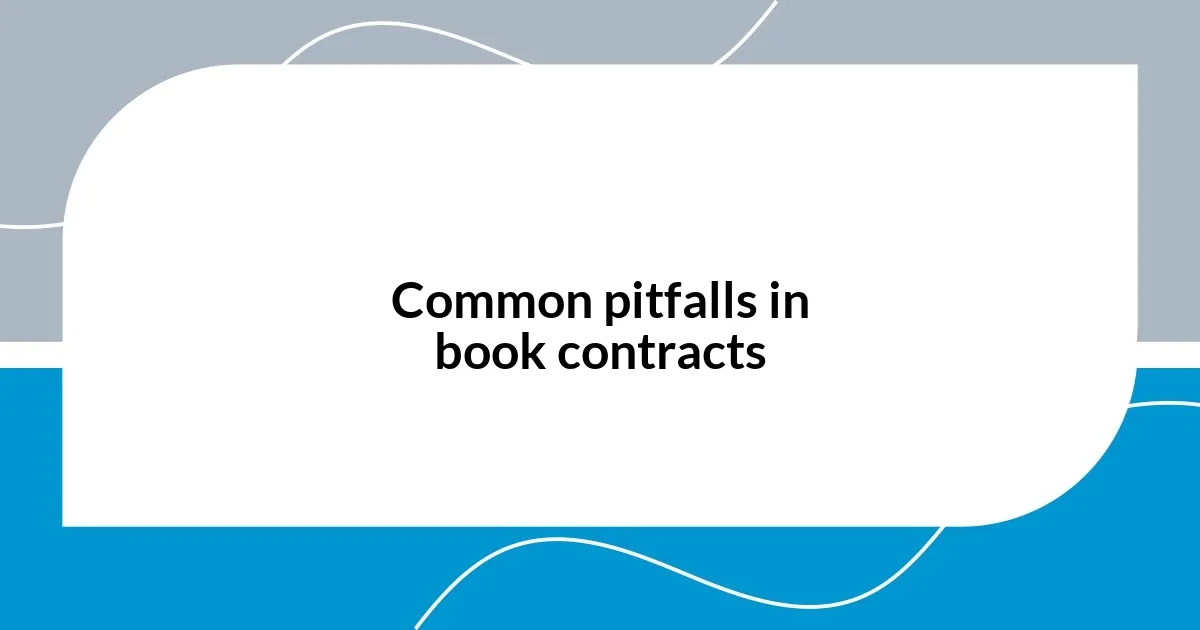
Common pitfalls in book contracts
One common pitfall in book contracts is inadequate clarity regarding rights and royalties. In my early days, I assumed that a higher advance guaranteed substantial royalties. I was shocked to learn that the structure of royalty calculations was much different than I expected; understanding the difference between net and gross sales was a revelation that fundamentally shifted how I perceived my earnings. What if I had taken the time to clarify those terms upfront? It would have saved me a lot of confusion later.
Another area where writers can stumble is in the termination clause. I remember feeling a sense of panic when I discovered my friend, an incredibly talented author, was locked into a contract that didn’t allow them to pursue new opportunities. It was a stark reminder of the importance of knowing exactly how and when you can part ways with a publisher. It’s critical to ask: are you really free to explore your next project, or are you shackled by the fine print?
Lastly, many authors overlook the importance of escalation clauses that can keep pace with a book’s success. I’ll never forget a conversation I had with a seasoned writer who expressed regret for not securing these clauses in their contracts. They understood that as a book gained traction, their royalty percentages could have increased, but they hadn’t negotiated for that flexibility. I often ask myself—how can we ensure our contracts evolve with our careers? It’s a vital point to consider in the negotiation process.
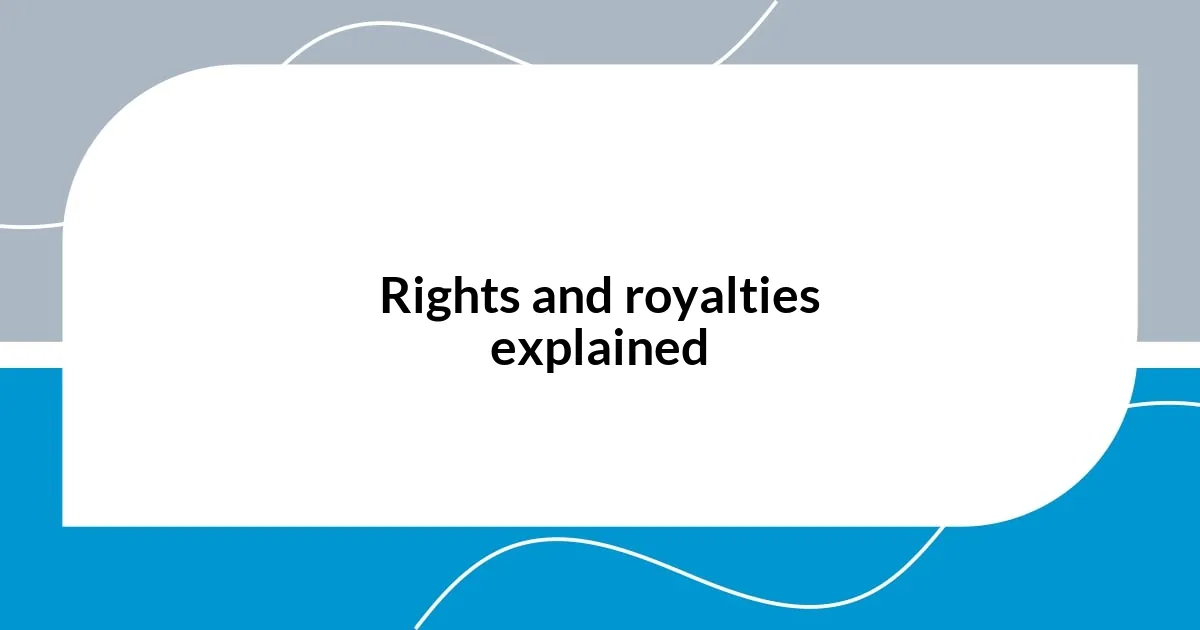
Rights and royalties explained
Understanding rights and royalties was a real turning point in my publishing journey. When I initially signed my first contract, I felt like royalty percentages were just numbers on a page. However, after some deep dives into how they were calculated, I realized I was missing the bigger picture. For example, I remember a time when I discovered that my royalties were based on net sales. That moment was like flipping a light switch—I was suddenly aware of how crucial it was to get clarity on these terms upfront to truly gauge the value of my work.
One lesson I learned is that not all rights are created equal. Early on, I was primarily focused on what’s directly profitable—like print royalties—but ignored broader rights like foreign translations or audiobook adaptations. One day, I received an email from a foreign publisher expressing interest in my book, and I couldn’t help but think, “What if I had not pushed for those rights?” It became clear that negotiating for beneficial rights isn’t just a nice-to-have; it could lead to new pathways I’d never even considered.
I also faced the reality of escalation clauses firsthand during a particularly successful book launch. They weren’t on my radar at the time, but now I see how they could have dramatically increased my earnings as my audience grew. Asking myself now, how different might my financial landscape look if I had brought this up earlier? Making sure that our contracts evolve alongside our success is something I passionately advocate for now—after all, it’s about future-proofing our careers and ensuring we’re rewarded fairly for our efforts.
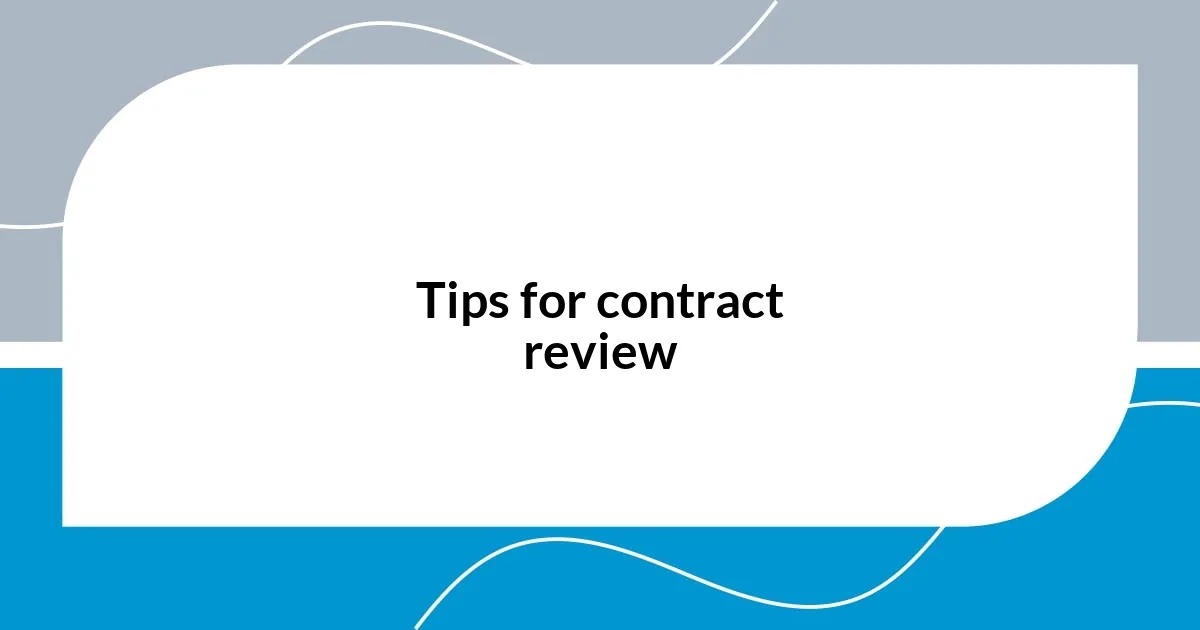
Tips for contract review
Tip number one is to meticulously read through your contract, ideally with a highlighter in hand. I once found myself skimming over my contract and missed a clause that restricted my ability to use my manuscript in future projects. It was frustrating to realize I had unknowingly given away a piece of my creative freedom. Always take your time—don’t rush; each word matters.
Next, don’t hesitate to seek professional help if something seems unclear or overly complex. I wish I had consulted an attorney during my first contract review. Instead, I relied on my instincts, which led to unnecessary stress when conflicts arose later. Taking the time to have an expert dissect the contract can provide clarity and peace of mind, ensuring that you’re not leaving anything to chance.
Lastly, make sure you understand deadlines. I once narrowly avoided disaster when I noticed an unrealistic timeline for submitting revisions. It prompted a discussion with my publisher that not only adjusted the deadline but also clarified expectations on both sides. Have you considered how timelines can impact your creative process? Open communication can prevent misunderstandings and keep your project on track.
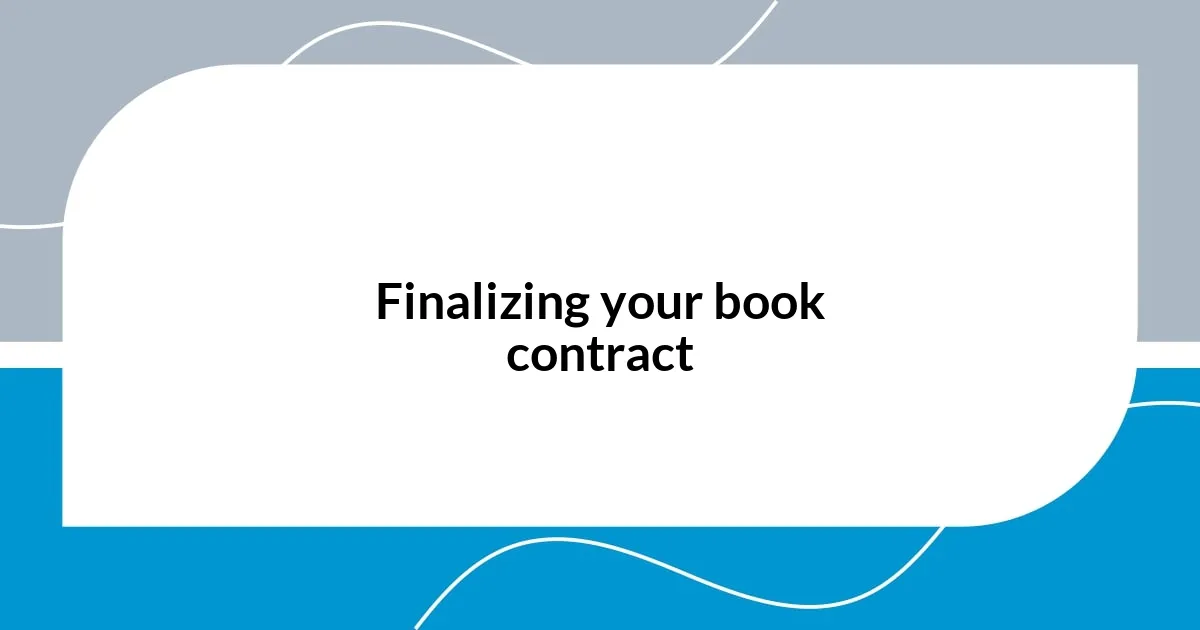
Finalizing your book contract
Once you feel ready to sign the dotted line, it’s essential to take a moment to reflect on what you’re truly agreeing to. I remember my excitement when finalizing my first book contract, yet there was a nagging voice in my head urging me not to rush. That moment of hesitation was crucial; I asked myself, “Do I genuinely understand every aspect of this contract?” A little extra time spent reviewing not only gave me peace of mind but also reinforced my confidence in the deal.
As you gear up to finalize your contract, consider negotiating any terms that still feel off to you. There was a point when I hesitated to discuss the publicity budget. I thought, “Maybe it’s just how this industry works.” But after a heartfelt conversation with a fellow author, I understood that advocating for yourself is essential. When I finally brought it up with my publisher, we came to an agreement that not only enhanced the promotion of my book but also made me feel valued as a partner.
Don’t forget to celebrate. Finalizing that contract is no small feat! It’s a significant milestone in your writing journey. I recall treating myself to a nice dinner to acknowledge the hard work and compromises that led me to this point. Have you thought about how rewarding this moment should be for you? Embracing that sense of accomplishment can fuel your motivation for the exciting work ahead.